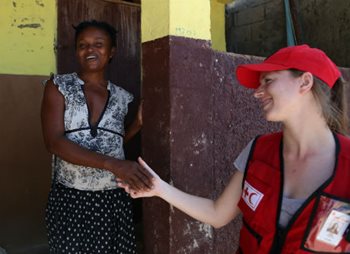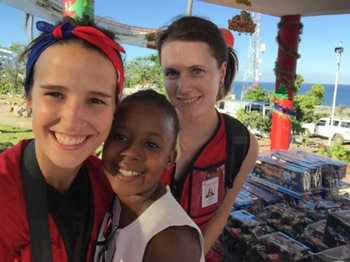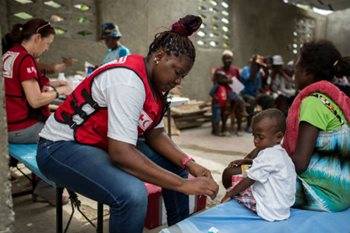“Although women and children have particular vulnerabilities following a disaster, they are also extremely resilient,” says Esmé Lanktree, Program Officer for Emergencies and Recovery for the Canadian Red Cross. “Women do whatever they can to take care of their families and communities.”
On March 8, 2017, Esmé spoke on a panel that discussed women and gender equality in Disaster Risk Reduction (DRR) at the Regional Platform on DRR in Montreal, Quebec.

“Gender and diversity are always important considerations for the Canadian Red Cross throughout all phases of an emergency,” Esmé said. “And the Hurricane Matthew response in Haiti was no exception.”
The Canadian Red Cross, with support from the Government of Canada, deployed its Emergency Health Clinic to support a variety of health needs in the aftermath of Hurricane Matthew in Haiti.
The medical team on the ground was comprised of Haitian, Canadian and French doctors and nurses, as well as psychosocial support and public health aid workers. Across these roles the Red Cross achieved a one-to-one ratio of men to women during the response.
It was also important to have both male and female interpreters available, which can often be challenging to achieve. However, the Red Cross knows how important it is, for example, to create a safe space for disclosure of sexual and gender-based violence.
 Esmé was actively involved in the Hurricane Matthew response from Canada, and was also sent to Haiti as a Public Health aid worker. During her time in Haiti, Esmé travelled with the Red Cross Mobile Health Clinics to remote areas that were difficult to access. In some cases, these clinics were the first humanitarian assistance to reach the area.
Esmé was actively involved in the Hurricane Matthew response from Canada, and was also sent to Haiti as a Public Health aid worker. During her time in Haiti, Esmé travelled with the Red Cross Mobile Health Clinics to remote areas that were difficult to access. In some cases, these clinics were the first humanitarian assistance to reach the area.
The mobile clinics treated more than 3,500 patients, over 60 per cent who were women and girls. The focus was providing basic care to pregnant women and children under five.
While in Haiti, Esmé worked with two local nurses who made an impact on her. The first, Fabienne, graduated first in her class from nursing school and had her pick among health centres where she could work. She chose to go back to her local community and after losing a family member, important documents, and part of her house in the hurricane, came to work for the Red Cross Mobile Clinic team. Esmé was struck by Fabienne’s ability to connect with people, taking her time with a new mother to provide breastfeeding advice, or with an older man to help him understand how to take his medication.
 The second nurse, Fabiola, started volunteering with the Haitian Red Cross in 2010, after losing everything to the devastating earthquake. After also being affected by Hurricane Matthew she was still very committed to her job as a nurse on the team. Esmé recalls that at each mobile clinic location she would be directing set up and suggesting improvements so that they could see more patients.
The second nurse, Fabiola, started volunteering with the Haitian Red Cross in 2010, after losing everything to the devastating earthquake. After also being affected by Hurricane Matthew she was still very committed to her job as a nurse on the team. Esmé recalls that at each mobile clinic location she would be directing set up and suggesting improvements so that they could see more patients.
“In Haiti, women are known as the central pillars of family,” Esmé says. “They were also central pillars of our response team on the ground.”
Over the past decade, we've improved the lives of more than 13 million women and children in 24 countries through our Maternal, Newborn and Child Health (MNCH) programs. Learn more about how we are helping mothers and babies through this program.